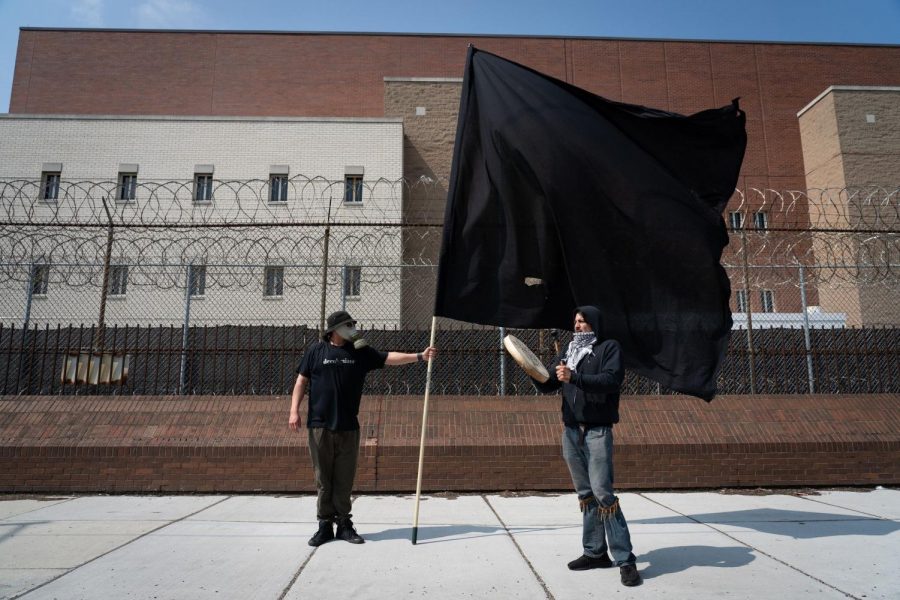As Cook County Jail cases balloon, activists advocate for inmates
E. Jason Wambsgans / Chicago Tribune
Activists protest outside the Cook County Jail calling for the mass release of incarcerated prisoners, April 7.
April 12, 2020
The nation’s largest known source of coronavirus infections lies around 25 miles from Northwestern’s Evanston campus.
As of Saturday evening, 304 inmates at Cook County Jail have tested positive for COVID-19, according to an update from the Cook County Sheriff’s Office. A total of 213 employees with the Cook County Sheriff’s Office, including 174 correctional officers, have contracted the virus. And there are likely many more cases: the jail acknowledged that these statistics likely downplay the actual problem because most of the jail’s 4,500 inmates haven’t been tested.
Two Cook County Jail inmates have also died from coronavirus-related complications, according to the Sheriff’s Office.
In response to the jail’s rapidly increasing number of cases, some Evanston and Chicago residents are advocating on behalf of inmates, calling for a mass release or organizing donation drives to supply protective gear.
U.S. District Judge Matthew Kennelly ruled April 9 that Cook County Sheriff Thomas Dart doesn’t have to grant immediate mass release of prisoners. But Kennelly ordered Dart to take actions to improve conditions, including testing of detainees who show symptoms or have been exposed to COVID-19 and the enforcement of social distancing. His ruling halts the use of crowded cells to hold groups of new detainees during the jail’s intake process.
Kennelly wrote that “detainees are being housed under conditions that make social distancing impossible.” He noted that beds are “separated by only one to four feet” and rooms that are “like a military barracks,” and went on to add that Dart hasn’t provided inmates with adequate supplies of soap, cleaning supplies or personal protective equipment like facemasks.
The Northwestern Prison Education Program, which provides a liberal arts education to Illinois inmates, is collecting donations to reduce the spread of COVID-19 in the Stateville and Logan Correctional Centers. Stateville already has 124 confirmed cases among incarcerated people and 58 among staff, according to the Illinois Department of Corrections.
https://twitter.com/MichaelBlayney5/status/1245113819921297409
Jennifer Lackey, the director of NPEP, said the donation drive has raised over $6,000, allowing NPEP to donate around 7,600 bars of soap, 2,400 surgical face masks, 10,000 gloves, 1,000 individual hand sanitizers and over 100 gallons of hand sanitizer. Lackey said incarcerated people are one of the most vulnerable groups affected by COVID-19.
“Nobody was prepared for a global pandemic, and nobody was prepared for a global pandemic inside jails and prisons,” said Lackey, who regularly teaches at Statesville. “Once it gets inside, it’s going to be very hard to keep it from spreading. There’s no social distancing that people can practice inside prisons.”
Chanting from their car windows and honking their horns, activists protested for mass release in an April 8 caravan outside Cook County Jail.
The following day, Revolution Club Chicago hosted a rally outside Chicago’s James R. Thompson Center to push for the immediate release of all prisoners who are awaiting trial, held on petty charges, elderly and seriously ill, or nearing the end of their sentence.
Several community organizers and political and religious leaders took part in the Revolution Club Chicago rally, including Rev. Michael Woolf, senior minister at the Lake Street Church of Evanston. Although Woolf wasn’t able to attend due to religious commitments, his statement was read at the rally.
Calling the prison system “a bastion of injustice,” he urged government officials to release high-risk prisoners, as well as those not convicted of crimes.
“The unequal health outcomes of the prison system are what has placed it under federal oversight,” Woolf wrote. “No one can be trusted to receive the medical care they need in this environment, and many of those who are in our prison system should not be there. We are the most over-policed and imprisoned nation in the world.”
He told The Daily protests and other forms of public activism can effect change. He added that religion informs his activism.
Advocating on behalf of prisoners is about more than just policy changes — it intersects with spirituality and service, he said.
“It’s not just a question of policy,” Woolf said. “It’s not just a question of what we want to enact. It’s not even a question of what’s popular. It’s about what’s right.”
Email: evaherscowitz2023@u.northwestern.edu
Twitter: @herscowitz



